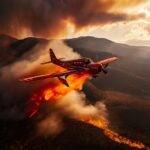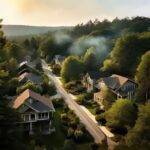Wildfire seasons in the Northwest have become synonymous with smoky skies, and recent studies reveal a concerning trend: the increase in wildfires has significantly reversed years of progress in air quality across the region.
Factors Contributing to Worsening Wildfires
Experts point to several factors exacerbating wildfires and the resulting smoke. University of Washington-Bothell Professor of Environmental Chemistry, Dan Jaffe, highlights fuel buildup, climate change-induced dryness in vegetation, and human activity in forested areas as key contributors to the escalating wildfire seasons.
Impact on Public Health
The rise in wildfires has led to a surge in health issues related to poor air quality. Overlake Medical Center in Bellevue reports an increase in patients suffering from asthma, chronic obstructive pulmonary disease (COPD), and similar respiratory ailments. Nurse practitioner Tyler Kuhk notes a significant uptick in patients experiencing adverse health effects due to deteriorating air quality, emphasizing the often underestimated impact of air pollution on respiratory health.
Reversal of Environmental Gains
Despite efforts by the Environmental Protection Agency (EPA) to regulate emissions and improve air quality, recent research indicates that wildfires have negated two decades’ worth of progress in the Western region. Areas in Washington, Oregon, and Idaho exhibit alarmingly high levels of black carbon pollution, further exacerbating the public health crisis.
Health Risks of Wildfire Smoke
Wildfire smoke poses unique health risks due to the minuscule size of its particles, capable of penetrating deep into the lungs and even entering the bloodstream. This heightened risk underscores the importance of proactive measures to mitigate exposure and safeguard public health.
Preparedness and Mitigation Strategies
Both Jaffe and Kuhk stress the importance of preparedness in coping with the impacts of wildfire smoke. Kuhk advises individuals, especially those with pre-existing respiratory conditions, to proactively discuss strategies with healthcare providers and invest in air purifiers or cost-effective alternatives like filtered box fans ahead of wildfire season.
Conclusion: Prioritizing Public Health in the Face of Environmental Challenges
As wildfires continue to worsen air quality across the Western USA, prioritizing public health becomes paramount. Proactive measures, informed decision-making, and collaboration between policymakers, healthcare professionals, and communities are essential in mitigating the adverse effects of wildfire smoke on respiratory health.
For more information on wildfire smoke’s impact on health, refer to HealthLink’s comprehensive resources.









Leave a Reply